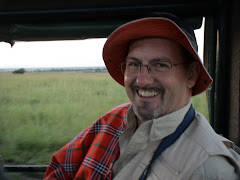Some of you have probably been wondering what happened to me, but I am back in Kabula after spending the bulk of the week south of here doing an EMPOWER class. Although we were only about an hour and fifteen minutes away, we stayed there because it was the first time venturing into that district and spending time with the family was important. We were in the Marenyo (Mah-RAIN-yo) area of the Nyanza District. This district borders Lake Victoria and is populated by the Luo's. If anyone is looking on Google Earth, then we were about 42 km west of Kisumu. The Luo's have been the hardest hit in Kenya in terms of HIV/AIDS. Depending on the area, the prevalence rate is anywhere from 15% to 40%. Overall in Kenya, 1 in 5 Luos are infected.
We stayed with the family of Canon Tobias. A Canon in the Evangelical Episcapol (Reuben's demonation) is not necessarily an ordained Reverend but serves as an advisor to the church. He is actually in an elevated position above even the Bishop. The homestead was quite traditional with the main house and then smaller out buildings that housed either grown sons, the elderly mother or other extended family members. The Canon has lost 2 brothers, a sister-in-law and a nephew to HIV. Addtionally, he has the widowed sister-in-law and another nephew living with HIV.
HIV in the Luo community is higher for a number of cultural reasons that are a bit different from the Luhya cultre where I am now. First, the Luo's are the only Kenyan tribe that do not get circumcised. That practice is VERY SLOWLY changing as people learn that circumcision can reduce transmission by up to 60%. Also, the practice of wife inheritance is much stronger. If a male sibling dies the children and any subsequent children to the widow are still considered the children of the deceased father. By "inheriting" the widow, the family unit all stays together and is cared for by the brother of the deceased. As you can see, this creates a problem when HIV is in the equation. I guess, finally, the other main difference is the role that Christianity and tribal culture are intertwined. People can fluctuate between the two beliefs more so than maybe other tribes.
The class started out with 21 participants. By the end though, we only had 8 people that sat for the exam and 7 of which passed. Language was, by far, the biggest problem. When the participants were recruited, the Canon should have made sure that they all spoke at least Kiswahili. Normally, everyone must be ablle to read and write in either English or Kiswahili so that they can take the exam. Many of the individuals were only able to understand Luo. That resulted in us having to, at times, translate from English to Kiswahili to Luo. Also, it ruled out the ability to take notes when many of them were illiterate. This was the first class that had so many people that both new their sttus and were open about it. In fact, 7 of the 8 that sat for the exam were living with HIV. Some of the older women that did not take the exam but attended the course were women caring for grandchildren.
I guess the final thing to note was the amount of times we prayed. ALthough the organization is not faith based, we typically begin and end classes with prayer because the members are usually recruited from church groups. But, in staying with the Canon, prayer developed a whole new meaning. Reuben had to come down a couple of days so we would pray because he arrived safely. Then, we prayed when he left to go back home so that he would make it safely. We prayed before we ate and after the meal. We prayed when I left the room to take a nap so that I would sleep well. It is not a bad thing, but it just seemd as if we were doing it every time I blinked.
Subscribe to:
Post Comments (Atom)

No comments:
Post a Comment